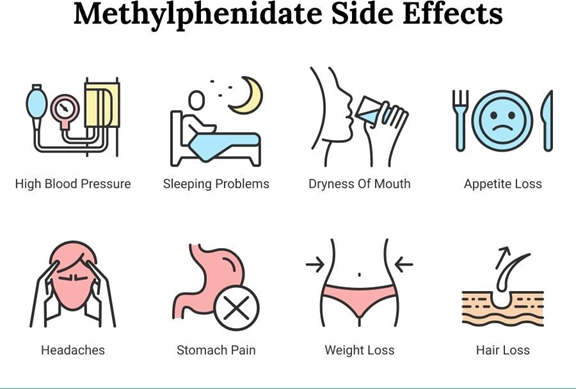The patient on methylphenidate (Ritalin) should be assessed for:
Signs of weight loss
Renal toxicity
Hypotension
Extreme euphoria and insomnia
The Correct Answer is A
A. Weight loss is a common side effect of methylphenidate (Ritalin) and should be monitored during treatment.

B. Methylphenidate is not typically associated with renal toxicity.
C. Methylphenidate can cause increases in blood pressure and heart rate, not hypotension.
D. Extreme euphoria and insomnia may indicate overstimulation or inappropriate dosing but are not typical side effects of methylphenidate.
Nursing Test Bank
Naxlex Comprehensive Predictor Exams
Related Questions
Correct Answer is D
Explanation
Explanation:
A. Diltiazem is not a beta blocker; it belongs to a different class of medications.
B. Sodium channel blockers are a different class of drugs used for various cardiac arrhythmias.
C. Alpha blockers are used to treat conditions such as hypertension and benign prostatic hyperplasia, but diltiazem is not in this class.
D. Diltiazem is a calcium channel blocker, commonly used to treat hypertension, angina, and certain heart rhythm disorders.
Correct Answer is C
Explanation
A. Ibuprofen is not typically contraindicated with calcium channel blockers.
B. Ranitidine is not typically contraindicated with calcium channel blockers.
C. Digoxin, a cardiac glycoside, can interact with calcium channel blockers, leading to increased levels of digoxin and potential toxicity.
D. Acetaminophen is not typically contraindicated with calcium channel blockers.
Whether you are a student looking to ace your exams or a practicing nurse seeking to enhance your expertise , our nursing education contents will empower you with the confidence and competence to make a difference in the lives of patients and become a respected leader in the healthcare field.
Visit Naxlex, invest in your future and unlock endless possibilities with our unparalleled nursing education contents today
Report Wrong Answer on the Current Question
Do you disagree with the answer? If yes, what is your expected answer? Explain.
Kindly be descriptive with the issue you are facing.
